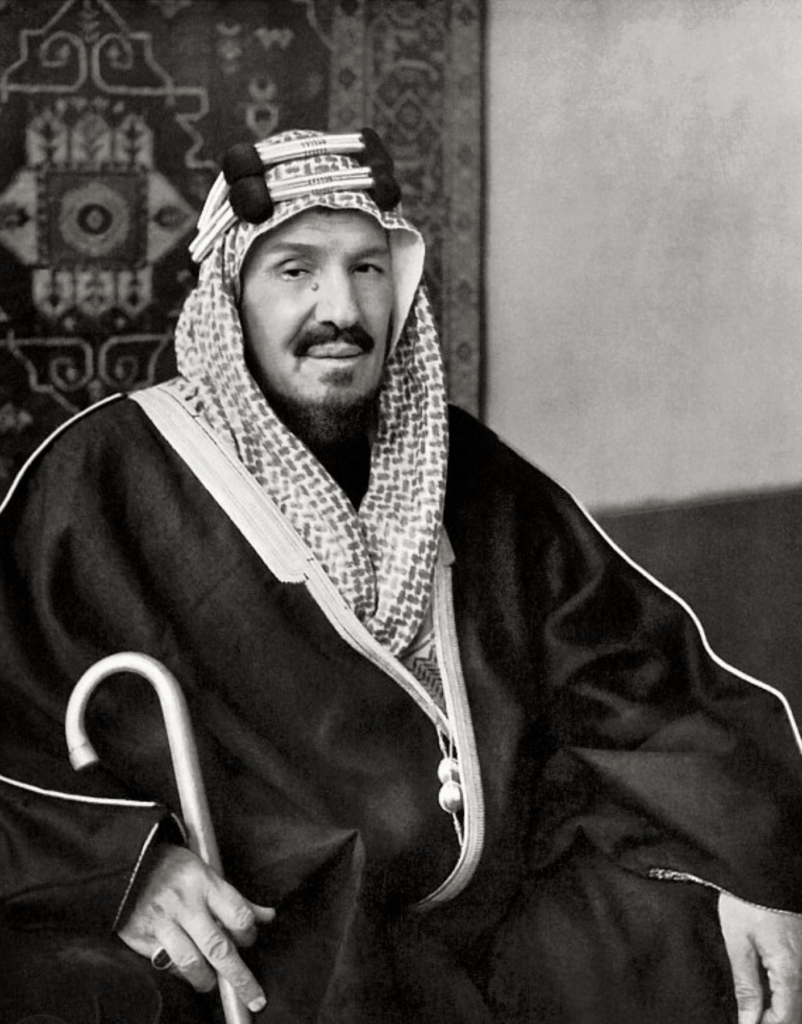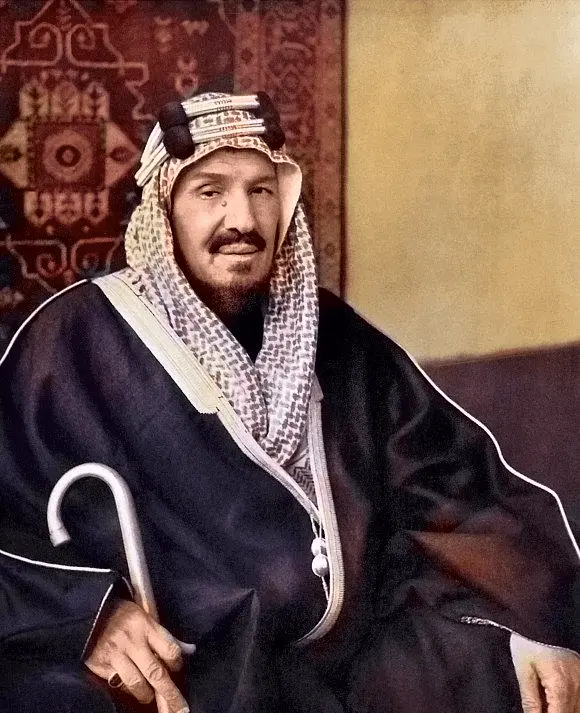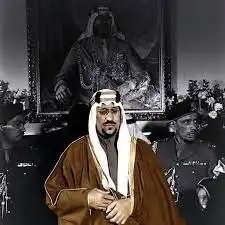
Ibn Saud Biography: Height, Ethnicity, Age, Net Worth, Siblings, Parents, Wife, Children
Ibn Saud, born Abdulaziz ibn Abdul Rahman Al Saud on January 15, 1875, in Riyadh, Saudi Arabia, was the founder and first king of Saudi Arabia.
He united the Arabian Peninsula through military campaigns, establishing the Kingdom of Saudi Arabia in 1932.
Trending Now!!:

Profile
- Full Name: Abdulaziz ibn Abdul Rahman ibn Faisal Al Saud
- Stage Name: Ibn Saud
- Born: January 15, 1875
- Age: 78 years old (passed away on November 9, 1953)
- Birthplace: Riyadh, Emirate of Nejd (present-day Saudi Arabia)
- Nationality: Saudi Arabian
- Occupation: Monarch, Founder and First King of Saudi Arabia
- Height: 6 ft 2 in (188 cm)
- Parent: Abdul Rahman bin Faisal Al Saud (father), Sara bint Ahmed Al Sudairi (mother)
- Siblings: Muhammad, Abdullah, Ahmed, Saad
- Spouse: Had multiple wives
- Children: 45 sons, including King Saud, King Faisal, King Khalid, King Fahd, King Abdullah, King Salman
- Relationship: Polygamous marriage
- Net Worth: Unknown
Early Life And Education
Ibn Saud, born Abdulaziz ibn Abdul Rahman Al Saud, was born on January 15, 1875, in Riyadh, which was then part of the Emirate of Nejd, in present-day Saudi Arabia.
He was born into the House of Saud, a prominent and powerful family in Arabian history. His father, Abdul Rahman bin Faisal Al Saud, was the Emir of Nejd, and his mother, Sara bint Ahmed Al Sudairi, came from a powerful tribal family.
Ibn Saud’s early years were marked by a period of exile. After the Al Rashid family defeated and exiled his family in 1891, he spent much of his youth in Kuwait.
His formative years were spent in the desert, where he was influenced by the harsh conditions, the traditions of his Bedouin heritage, and the dynamics of tribal politics.
Ibn Saud’s education was informal, focusing on Islamic studies and the traditions of leadership and warfare. His education centered on tribal leadership, religion, and the basic principles of governance.
Though he did not attend a formal school, his upbringing in a political and military environment eventually gave him the skills and knowledge necessary to lead the House of Saud back to power.
Ibn Saud was a member of the Al Saud tribe, an Arab tribe of Arab descent from the Nejd region that later played a significant role in the unification of modern Saudi Arabia. His tribe follows the Sunni branch of Islam, which remained a core part of his personal and political identity throughout his life.

Career
Ibn Saud’s career was marked by extraordinary military, political, and leadership achievements that shaped the course of Arabian history and the future of Saudi Arabia.
His rise to power began in 1902, when, at the age of 27, he led a successful raid to recapture Riyadh from the rival Al Rashid family. This move laid the groundwork for his eventual unification of the Arabian Peninsula.
Following the recapture of Riyadh, Ibn Saud began consolidating power in the central Arabian region of Nejd, uniting local tribes and strategically forging alliances with other influential groups.
His military campaigns were often characterized by tactical brilliance, diplomacy, and a deep understanding of tribal dynamics. His ability to unite diverse tribes under his leadership proved instrumental in his efforts to expand his territory and influence.
In 1913, Ibn Saud’s military expansion led him to capture the Hejaz region, home to Islam’s two holiest cities, Mecca and Medina. This was a significant achievement, as it solidified his political power and positioned him as a leader of the Islamic world.
His control over the Hejaz allowed him to foster close ties with the Arab and Muslim populations, further legitimize his rule. His strategic engagement with foreign powers also marked Ibn Saud’s leadership. His relationships with Britain and the United States were critical in securing support for his efforts to unify Arabia.
The discovery of vast oil reserves in the 1930s was a game-changer for Ibn Saud’s reign. The oil wealth that flowed into the kingdom transformed the region’s economy and elevated Saudi Arabia to a key player on the global stage.
The kingdom’s newfound riches allowed Ibn Saud to modernize the country and secure the future prosperity of his monarchy. In 1932, Ibn Saud officially founded the Kingdom of Saudi Arabia, consolidating the regions of Nejd, Hejaz, and surrounding areas into a single unified nation.
He became the first king of Saudi Arabia, a position he held until his death in 1953. During his reign, a centralized monarchy with modern institutions such as a national army, public education, and an administrative system was established.
Throughout his career, Ibn Saud carefully balanced preserving traditional tribal values and adapting to the modern world. He was known for his pragmatic approach to governance, which he helped foster stability in a region long fractured by tribal conflicts and external threats.
His ability to navigate internal politics and international relations complexities cemented his legacy as the founder of modern Saudi Arabia. Under his leadership, Saudi Arabia emerged as a united, sovereign nation, setting the foundation for the country’s future development and influence in the Middle East and beyond.

Personal Life
Ibn Saud, the first king of Saudi Arabia, married polygamously and had several wives throughout his life. His most notable wives included Al Jawhara bint Saad Al Sudairi, Hessa bint Ahmed Al Sudairi, and Mashael bint Mohammed Al Jiluwi, all of whom played key roles in his political alliances.
Ibn Saud fathered over 45 sons, with some of his most prominent children being King Saud, King Faisal, King Khalid, King Fahd, King Abdullah, and King Salman, many of whom later ascended to the throne. He stood at a notable height of 6 feet 2 inches (188 cm).
Net Worth
At the time of his death in 1953, Ibn Saud’s wealth was immense, though specific figures are difficult to pinpoint. His fortune primarily came from control over vast land and oil reserves.
After the discovery of oil in the 1930s, Saudi Arabia’s wealth skyrocketed, and Ibn Saud’s fortune was deeply tied to the kingdom’s burgeoning oil industry.
While his exact net worth at the time of his death remains unverified, it is estimated that his modern-day equivalent wealth would be in the billions, mainly due to Saudi Arabia’s oil wealth. The Saudi royal family’s financial empire continues to thrive, stemming from this pivotal moment in the nation’s history.
NOTICE!! NOTICE!! NOTICE!!
At TheCityCeleb, we strive to provide accurate and up-to-date biographies and entertainment content, focusing on celebrities. Our editorial team researches information from reputable sources, including interviews, official statements, and verified media.If you spot an error or have additional details, please contact us at editor@thecityceleb.com. We value your feedback and are committed to maintaining trustworthy content.


